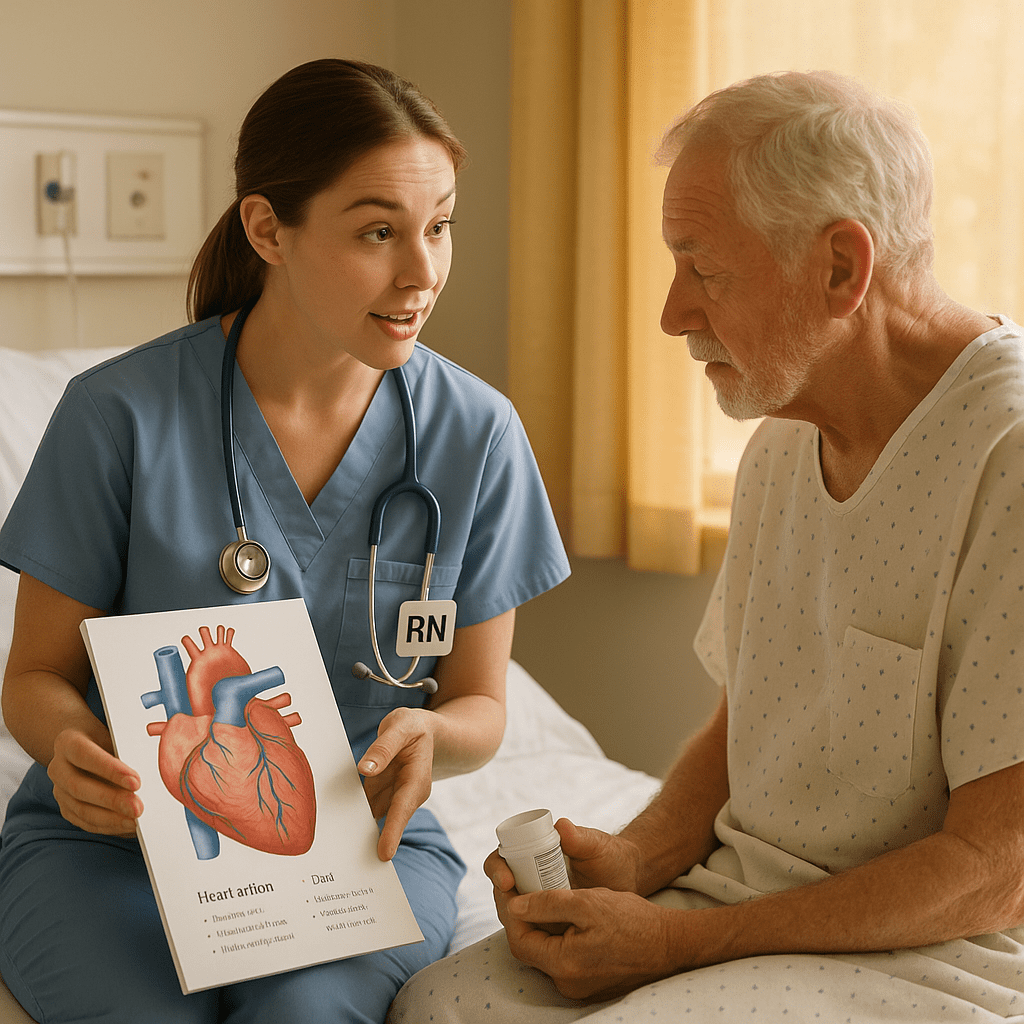Patient education is one of the most powerful tools nurses use to improve long-term outcomes—especially for those recovering from cardiac conditions. As a registered nurse (RN nurse), your role doesn’t end when the patient leaves the hospital. Effective teaching ensures patients understand how to care for their hearts, manage medications, and prevent readmission.
Heart health education is also a key focus area in NCLEX exams, testing a nurse’s ability to promote patient safety and self-management after discharge.
❤️ Why Heart Health Education Matters
Cardiovascular disease remains one of the leading causes of death globally. Many readmissions occur because patients do not fully understand their treatment plans, medications, or lifestyle modifications.
As a nurse, providing clear, simple, and culturally sensitive education helps bridge this gap. Patients who understand their condition are more likely to:
- Take medications correctly
- Follow a heart-healthy diet
- Engage in safe physical activity
- Recognize early warning signs of complications
Teaching strategies like the “teach-back method”—where the patient explains the information back to the nurse—are particularly effective and often highlighted in nursing bundles and NCLEX study materials.
🩺 The Nurse’s Role in Post-Discharge Education
Every registered nurse plays a crucial role in preparing patients for discharge by ensuring they can safely continue care at home.
Key Nursing Responsibilities:
- Assess Learning Needs: Determine what the patient and family already know.
- Use Simple Language: Avoid medical jargon and tailor education to the patient’s literacy level.
- Provide Written Instructions: Handouts reinforce verbal teaching.
- Include Family or Caregivers: They often assist in home management and medication adherence.
- Encourage Questions: Allow time for discussion and emotional reassurance.
These steps align with the NCLEX client education domain, which evaluates a nurse’s communication and teaching effectiveness.
💊 Medication Education
Patients recovering from cardiac conditions often take multiple medications—beta-blockers, ACE inhibitors, diuretics, or anticoagulants. Nurses must ensure patients understand:
- Why they’re taking each medication
- When and how to take it
- Possible side effects and when to report them
- Importance of adherence to prevent complications
Nursing Tip:
Encourage patients to use a medication schedule or pill organizer. Reinforce that missing doses can increase the risk of arrhythmias or heart failure exacerbation.
🥗 Lifestyle Modifications for Heart Health
Nurses are educators and motivators. Promoting healthy habits empowers patients to take control of their cardiac health.
Nursing Education Points:
- Diet: Encourage low-sodium, low-fat, and high-fiber foods. Teach patients to read nutrition labels.
- Exercise: Recommend gradual activity (e.g., walking 20–30 minutes daily) with physician approval.
- Smoking Cessation: Discuss resources and support programs.
- Stress Management: Introduce relaxation techniques such as deep breathing or mindfulness.
These lifestyle topics are emphasized in nursing bundles designed for NCLEX preparation and clinical practice excellence.
⚠️ Recognizing When to Seek Help
Education must include early warning signs that indicate complications requiring immediate attention:
- Sudden weight gain (>2 lbs in 24 hours)
- Increased shortness of breath or swelling
- Chest pain or palpitations
- Dizziness or fainting
Registered nurses should stress the importance of contacting a healthcare provider promptly if these symptoms appear. Early intervention can prevent rehospitalization.
🧠 NCLEX Tip for Nurses
In the NCLEX, expect questions focusing on discharge teaching and health promotion for cardiac patients.
Example:
“A nurse is preparing discharge instructions for a client with heart failure. Which statement by the client indicates understanding?”
✅ “I will weigh myself daily and call my nurse if I gain more than 2 pounds in one day.”
These questions assess whether nurses can reinforce self-management behaviors and recognize safe patient teaching outcomes.
🩹 Documentation and Follow-Up
Documentation ensures continuity of care. Nurses should:
- Record the content of education provided
- Note patient or caregiver understanding
- Include plans for follow-up appointments or referrals
Some healthcare facilities use nursing bundles for cardiac care that include checklists to track educational topics before discharge—an approach that supports NCLEX standards of care and safety.
🧩 Key Takeaway for Registered Nurses
Educating patients about heart health after discharge is a cornerstone of effective nursing care. Every RN nurse must combine clinical knowledge with empathy, communication, and teaching skills.
By reinforcing medication adherence, promoting healthy lifestyles, and ensuring understanding through teach-back methods, nurses empower patients to live healthier, safer lives post-hospitalization. These principles—rooted in evidence-based nursing and highlighted in nursing bundles—prepare both students and professionals for NCLEX success and exceptional patient care.

